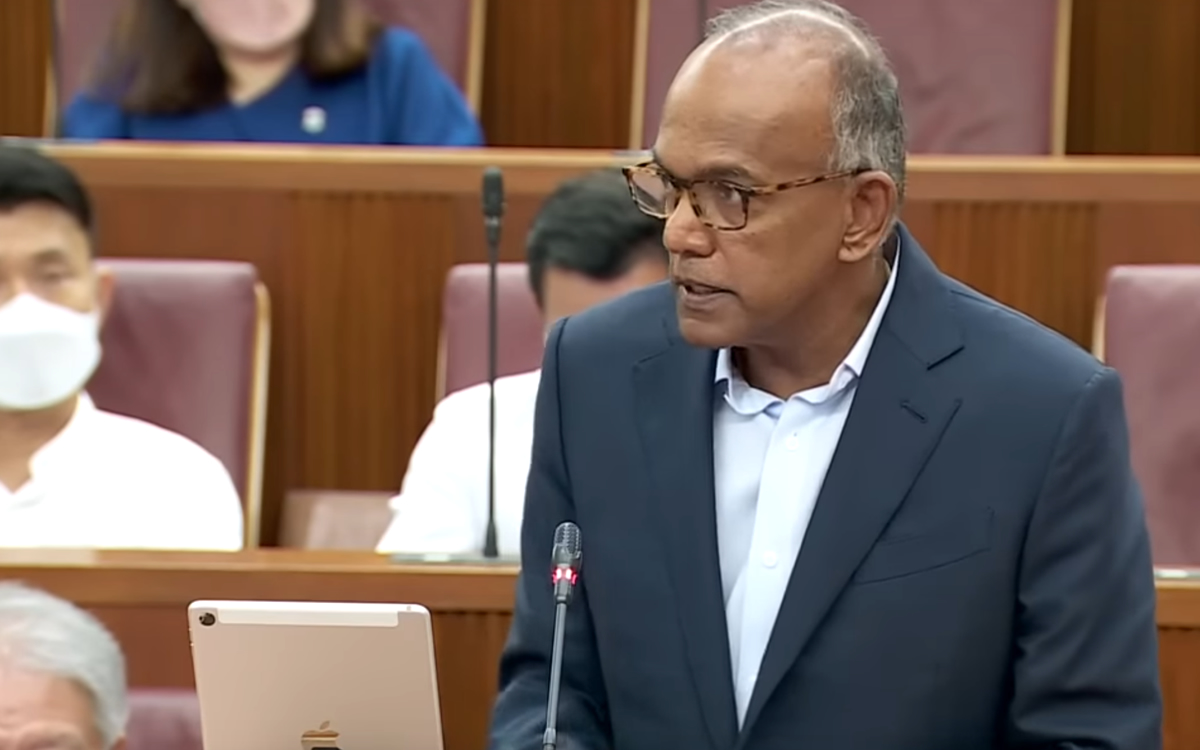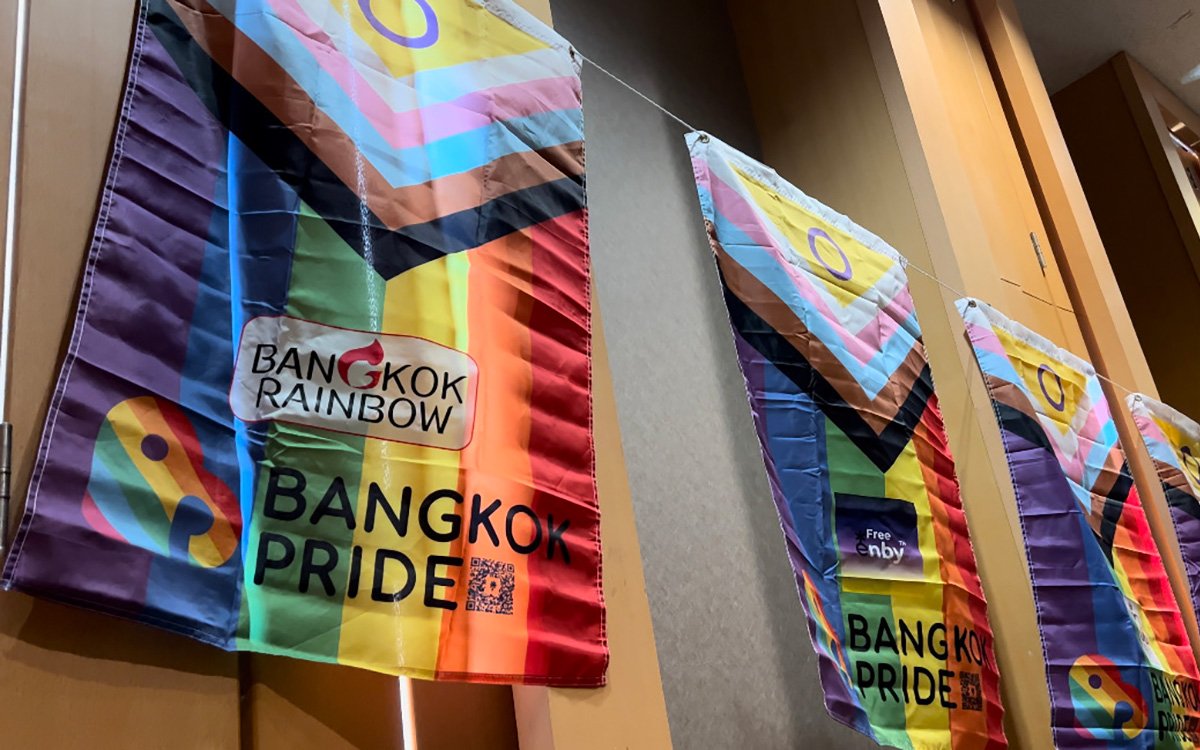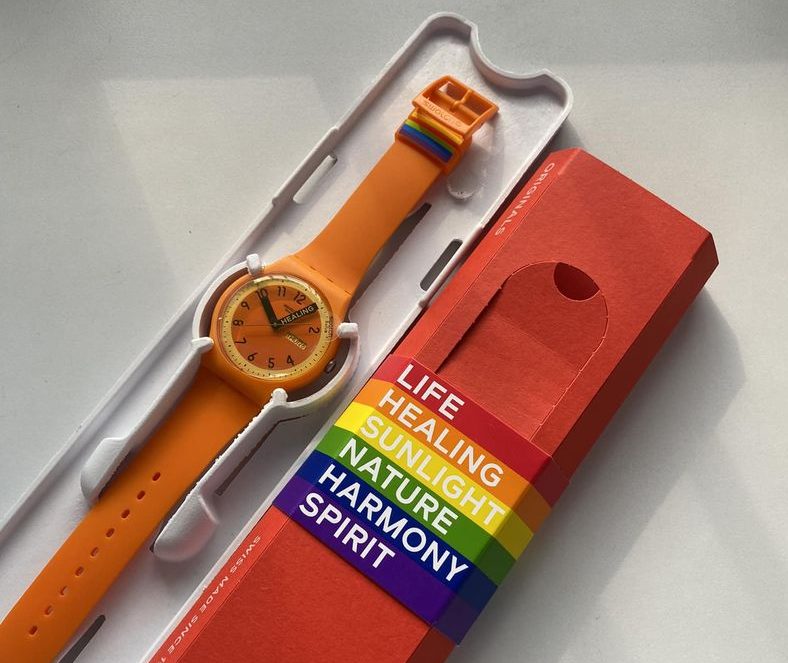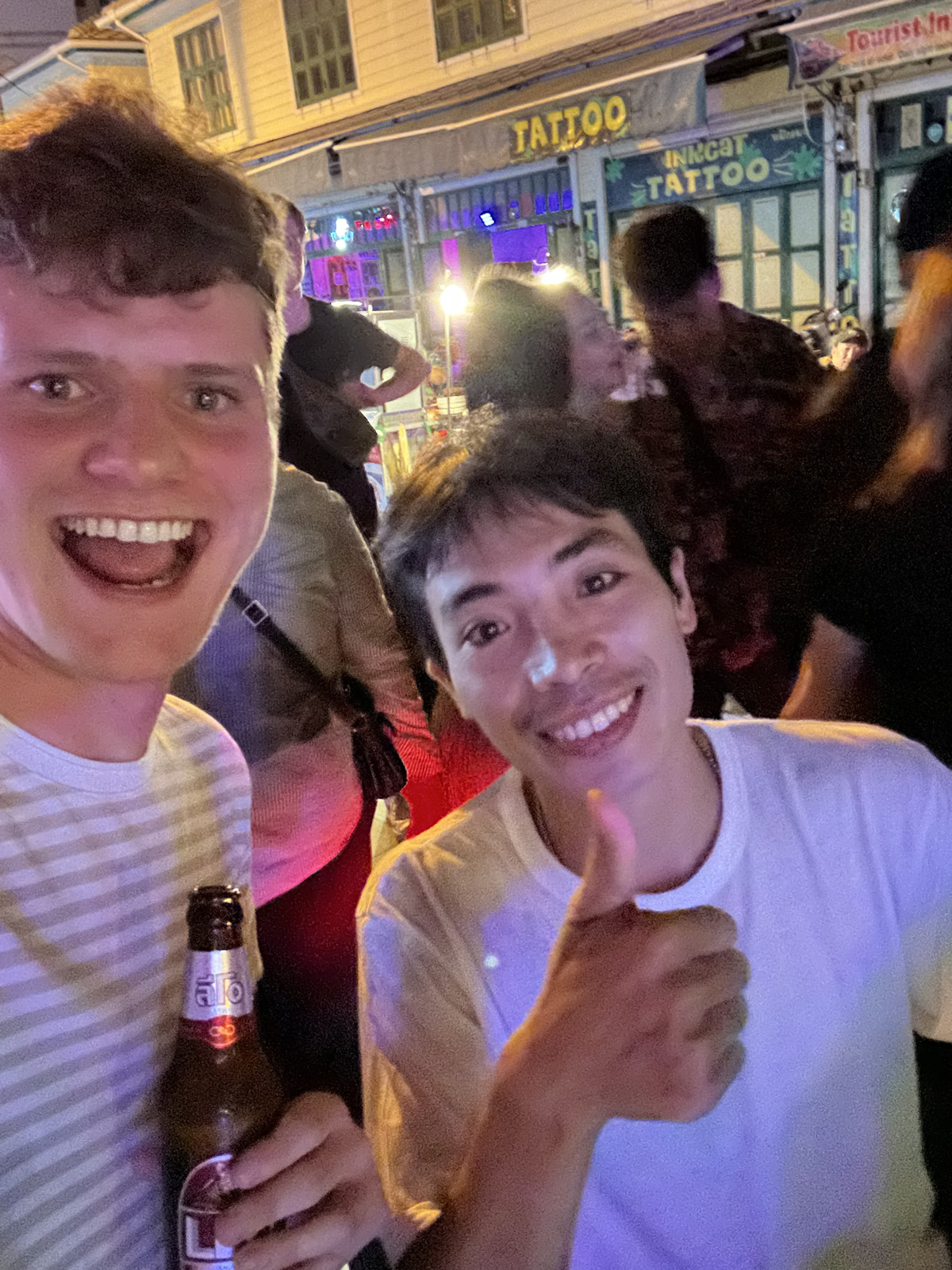Southeast Asia
Singapore will not prosecute ‘people engaging in gay sex’
BBC asked Home Affairs Minister K Shanmugam about sodomy law

A Singapore government minister last week said his country will not prosecute anyone under a colonial-era law that criminalizes consensual same-sex sexual relations.
“People engaging in gay sex will not be prosecuted, even though there is this old piece of law which makes gay sex among males an offense,” said Home Affairs Minister K Shanmugam on June 29 during an interview on BBC’s “HARDtalk” program. “The attorney general has confirmed that position and the Supreme Court has said that the government’s position is legal for us.”
Singapore is among the dozens of countries in which consensual same-sex sexual relations remain criminalized.
The country’s Court of Appeal in February upheld a lower court decision that dismissed three lawsuits against Section 377A of Singapore’s penal code. Shanmugam acknowledged a “significant proportion of our population — the middle ground as it were — don’t want that law repealed.”
“Attitudes are shifting somewhat, but still Singapore government can’t ignore those views, so we have arrived at this sort of messy compromise the last 15 years and we have taken this path because these issues are difficult,” he said. “They are not easily settled and we have made clear that LGBTQ+ individuals are entitled to live peacefully without being attacked or threatened.”
“This is a compromise that we have arrived at because of where our society is and if you believe in a democracy you’ve got to take into account where your main ground is,” added Shanmugam.
Shanmugam spoke with the BBC less than a week after the U.S. Supreme Court overturned Roe v. Wade. Shanmugam during the interview specifically referenced Justice Clarence Thomas and his assertion the U.S. Supreme Court should reconsider its rulings in the Obergefell and Lawrence cases that extended marriage equality to same-sex couples and the right to private, consensual sex.
“Our approach: Deal with these issues in Parliament,” said Shanmugam. “I’ve said earlier this year that we are relooking at our laws and our laws have to change and keep pace with the times and the Singaporean way we are engaging in a wide set of consultations to try and arrive at some set of landing.”
Southeast Asia
Thailand’s transgender community struggles to find health care
Trans people cannot legally change gender identity on ID cards, forms

Thailand, renowned for its welcoming travel destination for the queer community and its embrace of gender diversity, presents a paradox for its transgender population. Despite a perception of acceptance, the reality for trans individuals in the country reveals a landscape marked by challenges in gender-affirming care, gender recognition and healthcare access that impacts their overall health.
With two decades of activism under her belt, Nachale Boonyapisomparn, also known as Hua, co-founder of the Thai Transgender Alliance (ThaiTGA), sheds light on the pressure placed upon trans people to conform to societal norms, underscoring the limitations of acceptance within rigid societal structures and expectations, such as meeting certain behaviors and beauty standards.
“Acceptance still comes back to us still having to fit certain boxes,” Hua said.
A poignant example of this struggle is illustrated by Siwanon Khanvilaikul, who goes by Yok, a trans cabaret performer in Phuket who underwent gender reassignment surgery at 18 yet finds herself marginalized within the healthcare system.
“I feel biased. I am a woman in every way, but why is the final judgment based on that one small title [Mister] in front of my name?” Yok questions, highlighting the frustration of being relegated to a male ward in public hospitals due to outdated bureaucratic classifications as a result of the lack of gender recognition.
Yok cannot change her gender identity and prefix on government and legal documents, such as passports, birth certificates, identification cards and health forms. This inability to modify gender markers contributes to biased treatment within the healthcare system, creating an atmosphere of discomfort, isolation and frustration for trans individuals.
“When I am going in for care, my mental and emotional state is just as important,” said Yok.
Beyond the limited gender recognition, the lack of gender-affirming care further compounds the challenges trans people face in a healthcare setting. Kritima Jemma Samitpol, who goes by Jemma, a supervisor of the Tangerine Clinic, Thailand’s first trans-led community health clinic, emphasizes the dearth of trans-competent healthcare and the reliance on informal sources for medical guidance, such as TikTok, Facebook and friends.
“This is a problem,” Jemma declares, noting the risks posed by misinformation on hormone use within the trans community and emphasizing the need for accessible and affordable gender-affirming care to mitigate these risks.
While government-funded public hospitals are an affordable and accessible option due to Thailand’s Universal Health Coverage program implemented in 2002, providing virtually cost-free basic health prevention, screening and treatment, gender-affirming care is not mandated or covered under the current UHC plan. No gender-affirming care in public hospitals has put Yok at risk of discrimination and bias like misgendering. There are LGBTQ-friendly private hospitals and clinics, but they are predominantly concentrated in metropolitan areas, such as Bangkok, Phuket, Pattaya and Chiang Mai, and are not a part of UHC. Trans individuals in Thailand are left with a challenging choice between accessible and affordable but non-gender-affirming public hospitals, potentially laden with discrimination and stigma or LGBTQ-friendly private hospitals and clinics in larger cities that come with a higher price tag.
Despite these challenges, signs of progress emerge. The Tangerine Clinic stands as a beacon of hope, providing comprehensive and affordable gender-affirming care with a “come as you are” motto, encouraging the trans community to utilize health services and manage their well-being effectively. Jemma shared that the clinic continues to engage in capacity building for 11 community-based health clinics throughout Thailand, aiming to replicate the trans health service model of Tangerine Clinic.
The clinic’s collaborative research efforts with the Ministry of Public Health is a push towards integrating gender-affirming care into the national UHC program.
“There is a clear progress happening,” Jemma said.
The fight for trans rights extends beyond healthcare, with advocacy efforts targeting legal recognition and broader civil liberties. ThaiTGA’s campaign for legal gender recognition and allied causes, including same-sex equality and decriminalizing sex work, reflects a broader struggle for human rights and social justice.
“Gender recognition is a human right needed for advancing healthcare and ultimately achieving gender-affirming care,” Hua emphasized.
In the face of entrenched discrimination and institutional barriers, the resilience of individuals like Hua, Jemma and Yok serves as a testament to the ongoing battle for trans rights in Thailand.
“We must fight,” they affirm, embodying a hopeful narrative of progress toward a more inclusive and equitable society.
Editor’s note: The Pulitzer Center supported this story.
Southeast Asia
Malaysia bans Swiss watch maker’s LGBTQ products
Consensual same-sex sexual relations remain illegal in Southeast Asian country

The Home Ministry in Malaysia, a Muslim-majority conservative Southeast Asia country where homosexuality is illegal, punishable by punishments such as caning and imprisonment, announced that it has banned all Swiss watchmaker Swatch products that contain any LGBTQ elements, whether on watches, boxes or wrappers.
The ministry said the ban has been implemented under the Printing Presses and Publications (Prohibition of Undesirable Publications) Order 2023, noting that the Swatch products are “likely to be prejudicial to morality.”
“(The Swatch products) have been banned as they are detrimental, or possibly detrimental, to morality, public interest and national interest by promoting, supporting and normalizing the LGBTQ movement, which is not accepted by the general public of Malaysia,” the ministry said in its announcement.
“The home ministry again states its commitment to ensure public safety and peace by monitoring and controlling all forms of publications to curb the spread of elements, teachings and movements that contradict the local socio-cultural setup,” the statement continued.
In its announcement, the Malaysian government also warned that anyone found with or owns any such products produced by Swatch could face up to three years in jail or a maximum fine of RM20,000 ($4,372.06), or both, if convicted.
In May of this year, Malaysian authorities seized watches bearing the letters “LGBT” but, according to a lawsuit filed in July by the Swiss company, also confiscated watches from its 2023 Pride collection.
Al Jazeera reported in a lawsuit filed with the High Court in Kuala Lumpur, the Swiss watchmaker is seeking compensation and the return of 172 watches seized by officials over their alleged “LGBT elements.”
Swatch said in the filing that the seizure of the watches, valued at RM64,795 ($14,164.39), had no legal basis as well as including items that had no connection to LGBTQ activism.
“Without a doubt, the seized watches did not and are not in any way capable of causing any disruption to public order or morality or any violations of the law,” Swatch said in the lawsuit, which was filed on June 24 and first reported by the Malay Mail.
Media outlets and LGBTQ activists in Malaysia reported that authorities raided retail shops across the country, including in the nation’s large mega-shopping centers.
According to Al Jazeera, Swatch Group Chief Executive Nick Hayek at the time of the filing of the suit questioned how “peace and love could be harmful” and whether authorities would try to confiscate rainbows in the sky if it was possible.
The ministry and Swatch did not immediately respond to requests for comment.
Southeast Asia
Two nights in Bangkok: The spectrum of Thailand’s sex industry
Male sex workers come from variety of backgrounds

BANGKOK — At around 11 pm, the door knocked. “I think that’s Pop,” my friend Natalie said. She opened the door and he entered the apartment. He had a bob haircut, and smiled big, like he was trying to suffocate me with it.
“Is Pop a nickname?” I asked him. “Yes,” he said, still smiling and bobbing his head up and down. “It’s short for Popcorn.” Oh, of course. “What do you guys want to do tonight?”
I had spent most of the day touring Bangkok’s many temples. “Let’s do something fun. What’s the craziest thing you’ve experienced living here?”
Pop’s eyes lit up. He stared at Natalie and snickeringly mumbled something in Thai, which made Natalie laugh. “What? What is it? Include me!”
Pop turned back to me and explained that he had recently heard of a gay brothel, where all the men stand on a stage and you can point a laser to indicate which one you want. “Well, that does sound like a unique experience … Are we allowed to go and just talk to them,” I asked.
“I don’t see why not.” Pop googled the place, but it was closed for the night. “I have another idea. Follow me.”
Moments later, we were driving the streets of Bangkok, jamming to Pop’s Disney playlist. “Part of Your World” came on the queue. Pop looked at me questioningly. “What do you think about the new little mermaid?”
“I haven’t thought much about it,” I said. “Why?”
“I ask because some people here are angry about it. They don’t think Black people deserve to be mermaid.”
I puckered my lips contemplatively. The State Department had not briefed me on this issue. “You know what, I think they’ve earned it. They deserve to be mermaids if they want.” Pop smiled and nodded. “I agree.” We high-fived — a civil rights triumph!
“Ok, this is the street,” Pop said. Natalie put on a face mask, handing me one after. Pop remained maskless to help build trust.
We circled around the block. “Him? Him?” Pop pointed out the window at the nonchalant men loitering along the curb.
“I have no preference, whatever you want, Pop.” “Okay, I want him,” pointing at a man wearing basketball shorts, which I learned is the universal watermark for Thai male sex workers. We looped back around but someone else had snatched him by the time we got there.
“Noooo!” We all screamed. Pop buried his face in the steering wheel. After a prolonged moan, we resumed our search.
“Okay. Him.” We stopped and Pop negotiated with him for a bit before he entered the car. His name was Mai. Handsome, thin, kind eyes.
“A Million Dreams” from “The Greatest Showman” blared through the stereo. “I’m still upset that we lost the first guy,” Pop said. “Take it easy Pop. Can this guy speak English?” “No, we’re safe.”
We arrived at the motel where the parking lot was almost full. The hostess greeted us outside. “It’s 200 baht ($5.85) per person.”
“Per person?” Natalie asked. “But we’re just interviewing him.” The hostess was not buying the “interview” defense. “How many towels do you want?”
An incandescent bulb swung shyly, illuminating the hall. Doors cracked open and then slammed shut after paranoid eyes peeked out to find the coast not clear.
We got to our room. The mosquito-swarmed lights buzzed. The sheets had gone through some mileage, a Jackson Pollock with only colors that the body can produce.
Pop, totally unfazed by the bed’s condition, hopped on it, practically making snow angels in the bodily sediment. “Pop, what are you doing?”
“What? They wash them!”
There were two leather love seats by the bed. Natalie and I looked at each other, trying to recollect how expensive each of our shorts was should we decide to burn them afterward.
“You can’t get an STD from them — they’re leather,” Pop groaned. We begrudgingly sat at the very edge of the seats, minimizing contact.
Pop started asking Mai questions. I had to read Pop and Natalie’s faces to get the tone of what Mai was saying. Jaw drops, gasps, oohs.
Turns out, a hurricane of tragic circumstances brought Mai into the sex industry.
He moved to Thailand from Myanmar 10 years ago, sponsored for a work permit at a shrimp peeling facility. Every day he got to work at 8 a.m. and worked until 2 a.m., paid 3 baht for each kilogram of shrimp he separated, roughly $.09.
Desperate to build a more lucrative career, he got a 30,000 baht ($876.95) from a loan shark to start a food stand. Now working without a permit, he was unable to visit home. When his father fell sick and died he couldn’t go to his funeral. Making matters worse, he inherited financial responsibility for his aging mother.
His food stand fell under, and he had no choice but to make it back to the shrimp peeling facility. There, he met his current girlfriend. She became pregnant, adding to his financial stresses.
One day after work, he got in a cab and asked for the best place to be dropped off which was the same area where we picked him up. This is his first month in sex work, and we were his seventh customers.
Mai’s whole family thinks he’s working at a restaurant. Asking what would happen if they were to find out, he shook his head. “I’d have to explain that this was the end of the road for me. I had no other choice.”
I sensed, however, a creeping optimism from Mai. Since starting sex work, he has been able to make his loan payments, while supporting his family. Although, he still goes to bed hungry. “I don’t eat unless if I’m too tired to work, because I have to save,” he explained. He’s lost 8 kg (17.64 lbs.) these past few months.
This made Mai’s experience with his third client sting even more. After the session, Mai went to the bathroom. When he came out, his client was gone. Having just been cheated for free sex, he also had to pay for the room and the cab back to the curb.
Thai sex workers qualify for free STD testing, but Mai doesn’t qualify since he’s here with an invalid permit. He said one of his biggest concerns was getting diseases from standing outside in a long line of other sex workers while getting bitten by mosquitos. He gestured to several large welts on his arms.
Hearing this made my legs start to itch. I looked up at the ceiling to see a herd of swarming mosquitos. Looking over at Natalie, I saw she too was suffering from the same psychosomatic syndrome. She looked up if one could get STDs from mosquitoes, and confirmed that one cannot. We reassured Mai that the mosquitos were, in fact, the least of his worries.
Moving forward, Mai hopes to save enough to take care of his family, before ultimately moving back into the food industry. “My town never had good fresh food. My mother lives off dried noodles, and is very thin. I hope to someday bring her to Thailand, so I can take her out to dinner at a nice restaurant.”
The drive back to the curb was a solemn one. Pop, teary eyed, screamed “it’s too sad!” He turned the Disney playlist back on — “He Mele No Lilo” from “Lilo and Stitch” — to boost morale. At the curb, Mai waved goodbye and perched back up by his lamppost.
Pop, devastated by Mai’s story, still thought that we should interview someone else to get a more nuanced view of Bangkok’s sex industry.
The next day, we took a tuk-tuk to V-Club. V-Club. What a curious name for a gay sex parlor. Maybe it’s a bad translation, or maybe they’re trying to be facetious. From the outside, it looked like any old office building. You started to get a better sense of it in the courtyard, where a statue of a large phallus was planted in the dirt.
The lobby housed the infamous stage where a dozen-or-so shirtless men stood, winking, and waving. Periodically a laser would shoot across the room. Like a pseudo assassination, the escort would peel off the stage.
“This is craaaaazy,” I mumbled to Pop. After some arm wringing, we convinced the manager to let us both in the room. “No hanky panky!” We promised. We chose Bon: Chiseled, friendly and flamboyant.

Unlike the sex workers on the street, we didn’t have to go to a motel. This was a full-service stop. The room was nice, but steamy as hell, like someone had just showered. I winced. “Ahhhh! What is happening?!” “Sorry,” Bon said. He turned on the mini-split and the swampiness slowly began to dissipate.
After our conversation with Mai, we reflexively braced ourselves for something tragic. Bon explained to us how, if customers complain to management, for whatever reason, they’re not paid. Pop and I gasped, and bowed our heads pityingly.
“Has anyone ever complained about you?” I asked. His face grew stern.
“Noooo. Don’t be stupid!” He fell back onto the bed, and had a good long chuckle. Pop and I looked at each other, embarrassed by our former pity.
Bon leads a pretty posh life. He has a college degree, as do the majority of the V-Club employees. He had previously worked at his family’s veterinary business, but it couldn’t support his lifestyle. As a sex worker, he makes far more than his veterinarian father.
Around 80 percent of his clients are Chinese, and they come to Bangkok specifically to patronize V-Club. According to Bon, the clientele is generally attractive. “It’s really us that pick the client, not the other way around. If someone old or fat comes in we sit down, and they can’t choose us.”
What people ask for in their sessions is pretty conventional. Although he had one white client with a strange kink. Things were taking longer than they should have and, in a huff of frustration, the client asked Bon to pee on his face. “I said okay, stand over there.” Bon gestured towards the shower. “He cums so fast.” Bon was in stitches recalling this bizarre memory.
He generally meets between two and five clients per day (he only finishes with his last client), depending on the season, each paying upwards of 1500 baht ($43.85), plus benefits. Many clients bring him gifts, and some conscript his services for lavish vacations abroad.
One client paid him 40,000 baht ($1,169.27) a month for a year for exclusive access. He was given business class tickets to destinations like Hong Kong, Tokyo and Macau. He said that he considered doing Only Fans as well but was worried about his family finding out. They are accepting of his homosexuality, but sex work might push them over the edge.
Throughout our conversation, he would show us pictures of his most attractive clients. “Wait, are these photos posted on your own Instagram account?” I asked. “Yes, look at this Taiwanese model. This is him with my whole family,” he showed me proudly. “You brought your client to visit your family, the one that can’t find out you’re a sex worker?” “Yes, I couldn’t resist. He was so cute!” He told his family that they were just friends, but in one of the photos, I could see Bon’s uncle staring skeptically at Bon, donned in Versace, holding this Taiwanese model, mentally running the numbers on how any of this made sense. “Yeah, my uncle maybe figured it out. But he doesn’t say anything.”
I kept thinking about how much this contrasted with Mai’s experience. He had indicated that he would’ve liked to work at a higher-end brothel — safer, better pay. At the moment I thought getting Mai a job in the brothel would be the compassionate thing to do. Wait. Is that technically sex trafficking?
I showed Bon a picture of Mai and asked if he would fit in. Apparently looks weren’t the biggest obstacle, it was mindset. Mai’s poor English would be a problem, and he’d have to bribe the police since he no longer had a work permit. It wasn’t going to happen.
“Okay, I’m gonna yield the rest of my time to Pop.” Pop shook his head and said he’d leave with me. We hummed “How Far I’ll Go” as we trotted out of the brothel.
The next night I went to explore Khao San Road, one of Bangkok’s busiest streets, steeped in belligerent western debauchery. I saw a man weaving through the throng of people on his scooter, smiling and recording the spectacle. “Mai!” I screamed. It was him! I ran up and he smiled. I took a selfie to send to Popcorn and Natalie. I smiled too, knowing that at least on his night off, he seemed happy.




















